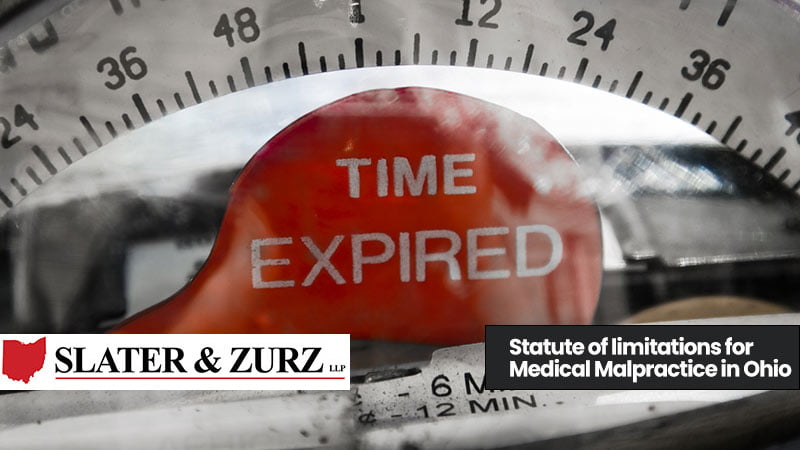Timing is everything, and this is certainly true regarding personal injury lawsuits. You and your personal injury lawyer have only a limited opportunity to initiate a lawsuit. There are different types of personal injury lawsuits, and each type must be started within its applicable time period.
Lawsuits filed against doctors, dentists, and others in the medical profession are no different. They, too, must be filed within a certain period of time, or else you could forever lose your ability to seek any compensation at all. This time period is referred to as the statute of limitations.
Ohio’s One-Year Medical Malpractice Statute of Limitations
Ohio’s statute of limitations for medical malpractice claims is only one year. If you find yourself hurt because of a medical error and want to bring a lawsuit against your medical provider, you have one year from the date your injury occurred. You may be ineligible for compensation altogether if you wait longer and try to file later.
In ordinary situations, the time period begins on the day you are injured. For example, if your surgeon tells you that they caused unintended harm to a blood vessel or tissue during your procedure, you would have one year from the date of that conversation to file your medical malpractice lawsuit.
Crucial Exceptions to the Statute of Limitations
The one-year time limitation may seem harsh, especially in situations where you or a loved one may not immediately know you were injured. Recognizing this, Ohio’s Legislature carved out several critical exceptions to the one-year statute of limitations. These limitations give you additional time to file or alter the date when the time period begins to run.
Notifying the Medical Provider of Your Intent to Sue
If you notify the medical provider you intend to sue in writing within the statute of limitations period, you are given an additional 180 days to file your suit. This could extend the statute of limitations if you are nearing the end of the one-year statute of limitations when you file your notice.
There are specific legal requirements governing this notice, including how the notice is to be delivered and the locations where it can be mailed. Failing to follow the letter of the law may mean that no extension is given.
Tolling the Statute of Limitations Based on Discovery
Some medical injuries are not immediately apparent. In some cases, it may be a year or more before you notice that something is wrong with your health, and your condition can be tied to a previous medical error. In such a situation, it would appear that the statute of limitations would keep you from being able to file a medical malpractice claim.
Ohio law makes an exception and tolls, or delays, the start time for the statute of limitations. If you had no reason to initially suspect a medical injury but later come to learn you may be the victim of medical malpractice, then the statute of limitations begins to run on that date.
There are caveats to this, however. The injury or harm must be discovered within three years of your procedure or the negligent error. If you do not file your claim within four years of the incident, then your claim will be forever barred.
Secondly, this tolling of the statute of limitations only applies when you had no reason to suspect you were injured by medical negligence. If you fail to keep follow-up appointments after surgery or refuse to see a doctor despite new and worsening symptoms, a court may not toll the statute of limitations for you.
Statute of Limitations Is Tolled for Incapacity, Incompetency, and Minority
Finally, the statute of limitations may be tolled by the court during periods of incapacity, incompetency, and minority. If you are in a coma due to a medical mistake or are otherwise physically incapable of discovering your injuries and taking action, the statute of limitations may be paused.
Similarly, the statute of limitations may be paused during periods when you are of unsound mind and cannot comprehend the nature of your injury or your right to file a claim. Being of unsound mind, though, is more than having difficulty understanding things. Following appropriate mental examinations, being of unsound mind requires a formal finding by a court.
The statute of limitations is also tolled for individuals who are minors at the time they are injured by medical malpractice.
In all of these cases, the tolling lasts only so long as the condition or situation lasts. Once incapacity or incompetency is removed, you are subject to the normal statute of limitations rules, and the time limitation to file a claim begins to run from that date.
In a similar manner, the statute of limitations begins to run once you reach the age of majority if you were hurt while you were a minor.
File Your Claim Today with the Help of an Ohio Medical Malpractice Lawyer
Ohio’s medical malpractice statute of limitations is not as simple as it may first appear. While the statute of limitations is designed to encourage you to file your claim quickly, it does recognize that filing a claim within one year of your injury or medical error is not always possible.
Your medical malpractice lawyer can review your situation and help determine whether the statute of limitations has expired. Your Ohio medical malpractice lawyer can also explore with you any periods where the statute of limitations should be tolled.
Nonetheless, the best advice is to speak with your medical malpractice lawyer as soon as possible if you believe you have been hurt by a medical professional. Your medical malpractice lawyers at Slater & Zurz stand ready to do everything possible to help you and your family protect your rights. Even if you believe you are beyond the statute of limitations, contact us at Slater & Zurz right away to discuss your situation with our legal team.






